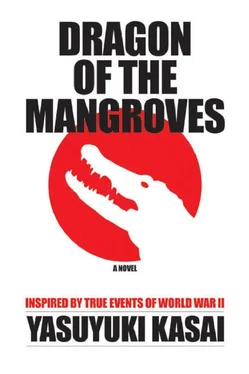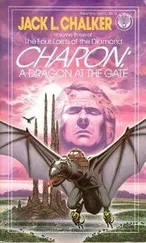Japanese military scrip had been overissued from the beginning, which gave rise to further inflation. Its value in Burmese cities was down, spurred by the counteroffensive of the Allies. Luckily, here in rural Arakan, disasters of war were few, so the scrip managed to maintain its value.
The rumor among the men was that British-Indian forces kept strafing every boat approaching Ramree. Fishermen would not sail where their lives, to say nothing of their valuable boats, were at risk. Although Sumi could acquire them by force—flashing guns and swords—he wanted to avoid doing so. He didn’t want the locals to nurse a grudge.
Sumi called Superior Private Yoshioka, who had an affinity for locals.
Yoshioka was an amiable, handsome man who was able to speak Burmese fluently. Sumi let him accompany Pondgi.
“Get some brand-new fishing boats by this evening, Yoshioka,” Sumi said.
“Do it by all means, but don’t act rough. You see?”
“I understand, Lieutenant. Leave the negotiating with the Burmese to me. I’ll be back with good boats,” answered Yoshioka cheerfully.
Pondgi also assured him, saying, “Master Sumi, it’ll be all right. Don’t worry.”
Sumi glanced at his watch after he had seen them off. The hands pointed to eleven. The blue sky was tranquil and didn’t show the slightest sign of turmoil from the air raid that morning. Between palm trees, he could see the sea glitter with reflected rays of the midday sun. All looked peaceful. But his compatriots kept lingering on the verge of death on the island only fifty kilometers away.
Departing without delay was a must. Sumi knew he should go there before the enemy brought the island under complete control. Otherwise, his own life would be at stake, not to mention the success of the rescue. If Yoshioka and Pondgi could collect boats, they could depart that night. He must use time beneficially.
There was no moment to lose. He wished for no more air raids that day.
Then he undertook the choice of personnel. He picked ten men who had scout experiences, although the final number depended on the capacities of the boats.
There was a knoll named Hill 509 on the east coast, according to the information from Yoda. And the garrison had entrenched there to fortify the all-around defense position, before moving in recent days. A hamlet called Yanthitgyi lay near the knoll, and the garrison seemed to be around that small settlement. Judging from the map, it was approximately forty kilometers from the Cape of Amou, the intended landing point, to Yanthitgyi. A forced march would be needed.
A reconnaissance regiment was—so to speak—a mechanized cavalry. Soldiers didn’t have to get accustomed to a heavy loaded march, unlike infantrymen.
Thinking they should be as light on equipment as possible, Sumi ordered Shimizu to arrange provisions for only several days.
“All right, but how are you going to get weapons?” Shimizu asked with a frown. Shimizu had a cynical look. Now even he seemed rather worried, because tankette companies had no excess of small firearms.
“Infantrymen will take care of that,” Sumi said. “I’m going to go and get them now.” Then Sumi started for the old temple again, with three soldiers as bearers.
Sumi didn’t worry much about weapons. He knew Second Lieutenant Kakegawa, his former candidate school classmate, working at the HQ of the 121st as an executive officer in charge of weapons was there. Sumi expected special treatment.
Arriving at the temple, Sumi came in the HQ office and requested to meet Kakegawa. Sumi didn’t recognize his former classmate right away. Kakegawa had become downright emaciated. But as soon as he saw Sumi’s face, Kakegawa greeted him cheerfully.
“Hi! Long time no see. How have you been? I’ve already heard about your duty from the regiment commander.” The tall, thin Kakegawa had a smile that lit up his gaunt face. “We have good things now. Come on. Follow me,” he said, and promptly took Sumi and the three soldiers to an arsenal.
Though the door was padlocked, it was only a shabby bamboo shack. “Here we keep submachine guns gotten from the British,” Kakegawa said. “Our HQ bans us to issue those, to tell the truth. But if you go to Ramree, it’s a reason to make an exception.”
Kakegawa had a strange gun in his hand as he left the shack. Made from pressed and welded steel, it looked more like an oilcan than a gun. The stock was not conventional wood, but a steel pipe. It was crude and rustic to an extreme, but the gun was compact and incredibly light, as well.
“This is the Sten gun,” he said. “Nine-millimeter pistol cartridges are used, so this can’t deliver bullets very far. But you can shoot more than four hundred rounds per minute. Its weight is one-third of our model ninety-six light machine gun. It’s very good for hand-to-hand fights and guerilla wars.”
Sumi had heard rumors about it. “Can we use it?” he asked. “We all got accustomed to light machine guns. But nobody has even touched one of these.”
“Yeah, it’s foolproof. It seldom goes wrong, since it’s simple. I’ve gotten permission for firing practice, so let’s go and shoot it.”
Kakegawa locked the shack and led Sumi to a hill behind the temple. When they entered a grove, he handed the gun to Sumi and explained how to use it. He pointed to a broad-leaved tree about ten meters away and said, “OK! Now suppose that trunk is an enemy. Shoot it.”
Sumi stood and squeezed the trigger silently. Continuous noises, like pops of beans, reverberated throughout the grove. The pellets stripped a large section of the tree’s bark, sprinkling wood chips. One of the soldiers shouted out in awe.
Sumi was very satisfied with this gun. It could kill more than one man at a time. Of course, the object of this operation was not combat but rescue. He knew he must keep everything confidential and undetected by the enemy. But if his party met resistance suddenly, such a weapon would be priceless. At the same time, he saw the reason why the Japanese favorite, the bayonet charge, lost effectiveness, since the enemy had started using this kind of weapon in the front lines.
Kakegawa murmured resentfully as if he read Sumi’s mind.
“If we had also had this gun, we wouldn’t have been thrashed in the Battles of Imphal or Kohima. The brass hats said that using a machine gun of American gangs led them astray. How stupid they are! Those stupidities have caused this debacle.”
Sumi nodded and asked, “Well, Kake, how many guns will you give us?”
“Three in all, with three thirty-two-round magazines for each. And you may take as many rifles and grenades as you want. It’s a lavish expenditure for us. Don’t complain.”
Everything seemed all right. The submachine guns were blessings.
Back at the arsenal, Kakegawa sorted the weapons and put them together in several wooden boxes. Sumi felt dizzy when he picked one of them up, and he couldn’t help falling to his knees.
“Are you OK?” one of his soldiers asked. “Haven’t you slept since yesterday?
Please leave them to us, sir.”
He realized he hadn’t slept for two days only after the soldier’s comment.
Kakegawa also worried about Sumi’s health and advised him to rest in the temple for a while. Thinking about the oncoming mission, Sumi decided to take the offer. He faced the three soldiers and said, “Tell my batman, Takahashi, to come and wake me up at dusk.” Then Sumi entered one of priest’s cells, guided by Kakegawa.
Japanese troops of the Burma Area Army utilized temples in more ways than one. They might have felt some affection as Buddhist nations, or supposed these Burmese religious institutions would be never chosen as enemy targets.
But Great Britain, the former suzerain, didn’t consider heathen piety even a little. Shells and bombs rained down on Burma, no matter where they were. This temple had also been hit in air raids a few days before. One bomb hit its lecture hall, and the precinct was in ruins. In spite of that, the monks never left. They wrapped themselves in yellow garments and held daily services as if nothing had happened. Their placidity set Sumi’s mind at rest somehow.
Читать дальше












